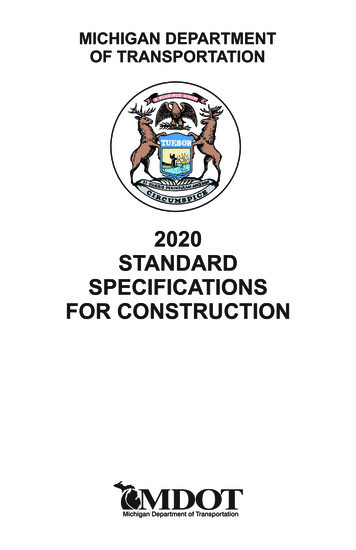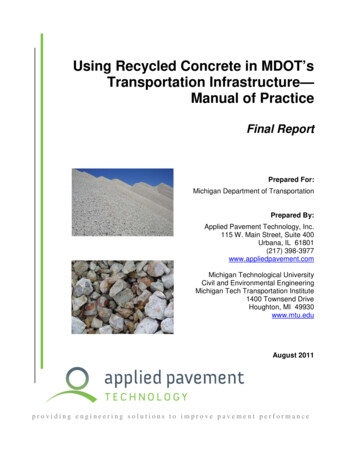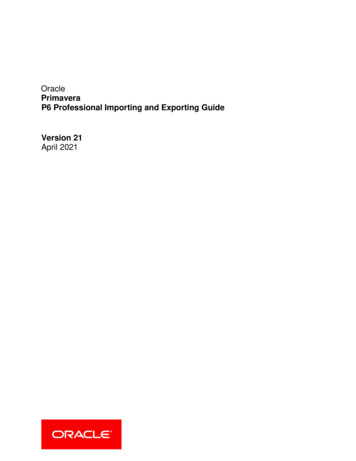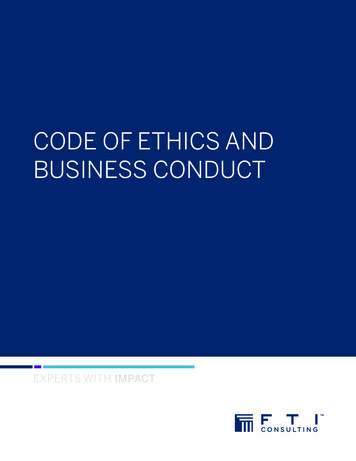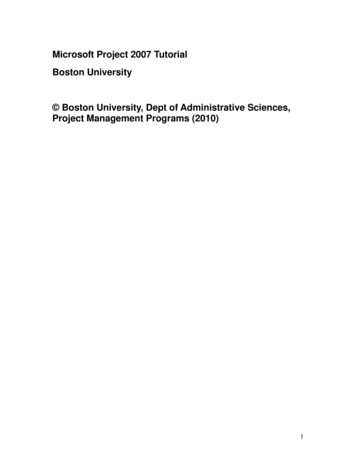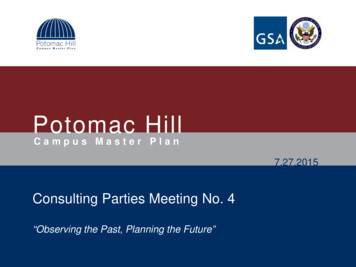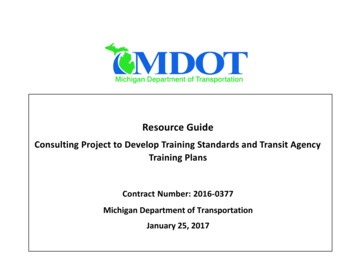
Transcription
Resource GuideConsulting Project to Develop Training Standards and Transit AgencyTraining PlansContract Number: 2016-0377Michigan Department of TransportationJanuary 25, 2017
2016-0377: Resource Guide & Implementation Plan ReportTable of ContentsResource Guide Introduction. 2I.Driver . 5II.Americans with Disabilities Act (ADA) . 12III.Drug and Alcohol . 16IV.Title VI . 20V.Maintenance . 24VI.Safety and Security . 27VII.Dispatch / Scheduling . 34VIII.Procurement . 38IX.Disadvantaged Business Enterprise (DBE) . 47X.Finance . 51XI.Human Resources (HR) . 57XII.Transit Management. 60XIII.Customer Service . 68P a g e 1
2016-0377: Resource Guide & Implementation Plan ReportResource Guide IntroductionThis Resource Guide provides a summary of recommended training courses available across a variety of training topics. This guide should be usedby Michigan transit agencies to support the development of their training program for all staff. The resource guide indicates training that must beprovided based on Federal or State laws and regulations, as well as suggested and elective training that can be implemented to improve practice.A list of proposed MDOT recommended training has been developed from this information, as outlined in Section VII Training ImplementationPlan. Transit agencies should review their existing training programs against this resource guide to identify any gaps in legally required trainingand explore other available training options that may be useful additions to their training program.This guide is an outcome of several research activities: a review of Federal and State statutes and requirements, interviews with other stateDepartment of Transportation contacts, site visits to five pilot sites, a survey of Michigan transit agencies to explore current training needs, andresearch into available training through document review and interviews with providers.TopicsThe following training topics are included as individual sections in this Resource Guide: I. Driver training VIII. Procurement II. Americans with Disabilities Act (ADA) IX. Disadvantaged Business Enterprise III. Drug and Alcohol X. Finance IV. Title VI XI. Human Resources V. Maintenance XII. Transit Management VI. Safety and Security XIII. Customer service VII. Dispatch and SchedulingIn addition to the topics covered in this resource guide, most Michigan transit agencies require some or all of their drivers to hold a CDL due tothe size of vehicles in service. This is an area which requires in-person training due to the practical nature of the requirements. Most agencieshave already developed training solutions, whether in-house, or through partnering with local agencies to deliver the training. Only 10% of surveyrespondents indicated that their agency desires more CDL training. For these agencies, CDL training providers should be found locally to provideflexible support when new staff are hired.All agencies will need to supplement the training included in this resource guide with training specific to their own agency, to ensure staff aretrained in their agencies policies, procedures and local requirements. For example, in addition to universal training topics such as customer serviceP a g e 2
2016-0377: Resource Guide & Implementation Plan Reportand Americans with Disabilities act (ADA), drivers will need training on local routes, fleet vehicles and specific agency policies such as pre-trip andpost-trip procedures.Resource Guide StructureEach topic section of this resource guide uses a standardized format to cover the information below:Applicable AgenciesAudienceRequirementTiming and FrequencyOverview of Subject andRequirementsKEY Knowledge PointsTraining CoursesIdentifies if the training topic is relevant to all agencies, or only some agencies depending on size, fundingsources or other element.The staff functions or positions relevant for this training topicThe training topics are categorized into the following: Training required by law or regulation – agencies must complete due to a requirement in federal orstate regulations – such as ADA, Drug and Alcohol and Title VI training Training suggested by MDOT – agencies must complete to be able to provide operations – such asdriver training Elective training – providing training to applicable staff in these topics is recommended bestpracticeIndicates at a high level of this training is relevant for new hires before starting operations, or refreshertrainingProvides a short description of the federal or state requirements if applicable. Outlines the key subjectscovered in this topic.Outlines the areas of knowledge provided by this trainingOutlines summary information on other training courses available for this topic, including the followinginformation in the chart below:Course ProviderCourse TitleLengthModeCostApplicabilitySchedulingLink to materialsName ofproviderAs publicized# days orhoursFor example,on-site,eLearningBased onpublishedinformation (attime of writing)If the trainingcourse is onlyapplicable forsome agencies(based on size,funding source)Availability ofcourse orsuggestedscheduleLink Providingmore informationon each courseP a g e 3
2016-0377: Resource Guide & Implementation Plan ReportTraining Agenda forrecommended Course(S)The current agenda for the key recommended courses are provided for reference purposes.P a g e 4
2016-0377: Resource Guide & Implementation Plan ReportI.DriverSUMMARYTopic AreaApplicable AgenciesAudienceDriver Training All DriversSupervisors and otheroperations staffRequirement Timing andFrequency Training is suggested by MDOT for bus anddemand response vehicle operatorsNew hires (before operational role)Refresher training (annual)OVERVIEW OF SUBJECT AND REQUIREMENTS Provide training to operators on passenger safety and serviceCover ADA requirements; disability awarenessProvide coverage of fixed route ADA service requirementsInclude emergency and evacuation proceduresProvide information and hand-on training in wheelchair list and ramp operationsKEY KNOWLEDGE POINTS 5 key points for fixed route ADA such as wheelchairaccommodation, allowing time to board and disembark,covering using use of oxygenators,Wheelchair lift and ramp operationBus maneuversTransit security Dealing with customersPre and post trip reports/Bus InspectionsService standards for fixed routeScheduling and pull-outsDefensive DrivingP a g e 5
2016-0377: Resource Guide & Implementation Plan ReportTRAINING COURSESCourseProviderRTAP/CTAATAPTCOCourse TitleLengthModeCostApplicabilitySchedulingLink to materialsPassengerService andSafety (PASS)2 days; 3days withtrain rningavailable butdoes notinclude handson wheelchairlift or ADAfeatureoperationsVideos andself-pacedtrainingRTAP: 4,000;CTAA: to benegotiated5311 and5310Reviewongoingschedulespublished orhire a trainerto presentnear or onnear facilityhttp://training.ctaa.org/5311 and5310Purchase theprogram; havea localmanager ortrainerpresent, orhire a PASSapprovedtrainer topresenthttp://taptco.com/Transit Bus or 2 daysParatransitBus DriverTrainingCTAAeLearning: 24- 35 perstudent 4,500 perprogramP a g e 6
2016-0377: Resource Guide & Implementation Plan ReportCourseProviderDriver trainingprogramCourse TitleLengthModeCostApplicabilitySchedulingLink to materialsTransit Bus orParatransitBus DriverTraining; RailOperatortraining4-8 weeks;dependingonexperience,CDL, andagencyVideos, selfpaced,presentations;hands-onoperationstraining andfeedbackRequires atraining staffmember tocoordinateand run thetraining aining8 hours peryearSelf-paced “2the point”Cards5311 and5310 fundedagenciesAgencyRefreshertrainingDriver andoperatorrefreshertraining40 hoursClassroomstyleRequires atraining staffmember tocoordinateand run thetraining classRequires atraining staffmember tocoordinateand run thetraining classDevelop acustomizedprogram: CanuseTransportationSafetyInstitute’straining andinstructionguidesAt beginningor end ofshifts, Summermonths orreducedservice timesAt beginningor end ofshifts, Summermonths orreducedservice times5307 fundedagencieshttp://nationalrtap.org/N/AP a g e 7
2016-0377: Resource Guide & Implementation Plan ReportTRAINING AGENDA FOR RECOMMENDED COURSE(S)CTAA Passenger Assistance Sensitivity and Safety (PASS) Trainer and Driver CertificationThe (PASS) Trainer and Driver Certification Program ensures that community transportation drivers have current expertise inpassenger assistance techniques and sensitivity skills appropriate for serving persons with disabilities. The PASS program isdesigned as a three-day Train-the-Trainer to certify trainers who can then train drivers or as a two-day Driver program in whichour instructors train your drivers. Some of the advantages of offering the PASS certification program is the ability to reduceorganizational liability; comprehensive, up-to-date training on the assistance drivers should be providing to passengers withspecial needs; intensive emergency situation training; certification oversight provided by national leaders in the communitytransportation field; and updates for all participants on relevant regulatory changes. The certification is valid for three years andcan be renewed on-line or by attending a PASS workshop.The course outline for the two-day driver certification program as well as the three-day trainer certification includes:Day 1: Trainer Certification Distracted Driving and Driver Fatigue Transit Employee Occupational Safety and Health You as a Professional Professional Driving Customer Service Communication Stress People First Language Americans with Disabilities Act Assisting Passengers with Service Animals Disability Awareness Diabetes Epilepsy or Seizure DisordersP a g e 8
2016-0377: Resource Guide & Implementation Plan ReportDay 2: Trainer Certification Bloodborne Pathogens Kidney Dialysis Mobility Equipment and Features Lift Operating Procedures (Hands-On Training) Wheelchair and Occupant Securement (Hands-On Training) Transporting and Aging Society Sexual Harassment Accidents and Emergencies Evacuation Fire ExtinguishersDay 3: Trainer Certification and Trainer Recertification Concepts Elements of Training Characteristics of Adult Learners Characteristics of a Good Trainer Conduct of the Instructor Motivation Advice to Instructors Certification and Recertification examinationTo be certified as a PASS Trainer, all three days of training must be attended.P a g e 9
2016-0377: Resource Guide & Implementation Plan ReportTransit & Paratransit Company (TAPTCO) Transit Operator or Paratransit Operator Development CourseTAPTCO’s program covers the following subjects:1. Introduction to Professional Driving2. Federal Regulations3. Hazards Communications4. Creating a Drug & Alcohol Free Workplace5. Preventing Harassment6. Bloodborne Pathogens7. Fatigue Management8. Wellness9. Whistleblower10. Introduction to the Bus11. Re-Trip Inspections12. Mirror Adjustments & Reference Points13. Safety Best Practices14. LLLC Defensive Driving15. Preventing Driver Distractions16. Following Distance17. Intersections18. Railroad Crossing19. Pedestrian Awareness20. Preventing Backing Accidents21. Merging, Lang Changing & passing22. Special Driving Conditions23. Map Reading24. Introduction to ADA & Sensitivity25. ADA, Lifts, Ramps & Securement26. Professionalism/Customer Service27. Conflict/Aggression Management28. Accident & Emergency ProceduresP a g e 10
2016-0377: Resource Guide & Implementation Plan ReportNational RTAP 2 the Point Training CardsThis program offers self-paced refresher training cards in the following areas: ADA and Sensitivity Bloodborne Pathogens Customer Service Defensive Driving Distracted Driving Drugs and Alcohol Emergency Management Passenger Safety Transporting Non-Ambulatory PassengersFTA Transportation Safety Institute Operator/Employee TrainingThe scope of the Vehicle Operations training unit is defined by its eight subunits:1. Vehicle Orientation/Familiarization2. Pre-trip and Post-trip Inspections and Reporting3. Equipment Types and Procedures4. Defensive Driving5. Service Area Orientation6. Shop and Yard Safety Procedures7. Driving LicenseP a g e 11
2016-0377: Resource Guide & Implementation Plan ReportII.Americans with Disabilities Act (ADA)SUMMARYTopic AreaApplicable AgenciesAudienceAmericans with Disabilities Act (ADA)Requirement All DriversSupervisors and otheroperations staffDispatchers and othercustomer facing rolesTiming andFrequency Training is required by law (42 USC § 12101;49 CFR Parts 27 and 37)New hires (before operational role)Refresher training (annual)OVERVIEW OF SUBJECT AND REQUIREMENTSThis training would include reasonable accommodation policies. The training would also cover State of Michigan Recipient Rights requirements.In addition, coverage of ADA fixed route and demand responsive requirements will be provided.KEY KNOWLEDGE POINTS Reasonable modificationRecipient rights ADA fixed route requirementsDemand Response requirements such as on-timeperformance, missed trips, cancellations and excessively longtripsP a g e 12
2016-0377: Resource Guide & Implementation Plan ReportTRAINING COURSESCourseProviderCourse TitleLengthModeCostApplicabilitySchedulingLink to narAllAs possible;before andafter shifts;slowertimes uidance/civil-rights-ada/adatrainingFTAADA FixedRoute60minutesWebinarAllAs possible;before andafter shifts;slowertimes uidance/civil-rights-ada/adatrainingFTAADA DemandResponsive40minutesWebinarLocal stafftoscheduleandfacilitatebased onlocal policyLocal stafftoscheduleandfacilitatebased onlocal policyLocal stafftoscheduleandfacilitatebased onlocal policyAllAs possible;before andafter shifts;slowertimes uidance/civil-rights-ada/adatrainingP a g e 13
2016-0377: Resource Guide & Implementation Plan ReportCourseProviderCourse TitleLengthModeCostApplicabilitySchedulingLink to materialsAgency todevelopRecipientRights2-4 hoursOn-lineLocal stafftoscheduleandfacilitatebased onlocal policyAgencies thatprovidetransportationservices formental healthproviders;providers cangive guidanceon trainingneedsAs possible;before andafter shifts;slowertimes 94 27717-224979--,00.htmlP a g e 14
2016-0377: Resource Guide & Implementation Plan ReportTRAINING AGENDA FOR RECOMMENDED COURSE(S)FTA: Reasonable Modification of Policy: New Final RuleWebinar Agenda: Reasonable modification: What is it? Reasonable modification: What isn’t it? Local process for handling RM requests FTA’s oversight roleFTA: ADA Fixed Route Service Requirements – FTA Circular 4710.1Webinar Agenda: Background Chapter 6: Fixed Route Service QuestionsFTA: The ADA and Demand Responsive Service Requirements – FTA Circular 4710.1Webinar Agenda: Background Chapter 7: Demand Responsiveness Service QuestionsP a g e 15
2016-0377: Resource Guide & Implementation Plan ReportIII.Drug and AlcoholSUMMARYTopic AreaApplicable AgenciesAudienceDrug and Alcohol All DriversDispatchersMechanicsOther safety sensitive rolesSupervisors with staff insafety sensitive rolesRequirement Timing andFrequency Training is required by law (49 USC 5331, 49CFR part 40, and 49 CFR part 655)New hires (before operational role)Refresher training (annual)Reasonable suspicion training provided tosupervisors (one-time training minimum)OVERVIEW OF SUBJECT AND REQUIREMENTSThe FTA requires that agencies receiving direct funding to have a Drug Free Workplace policy. In addition, FTA and State funded agencies mustalso conduct drug and alcohol reasonable suspicion training for supervisors of safety-sensitive staff.KEY KNOWLEDGE POINTS Drug Free WorkplaceRandom TestingReasonable Suspicion Drugs and Alcohol PolicyP a g e 16
2016-0377: Resource Guide & Implementation Plan ReportTRAINING COURSESCourseProviderFTACourse TitleLengthModeCostApplicabilitySchedulingLink to materialsDrug 0MinutesVideoLocal stafftoadministerLocal gov/DrugAndAlcohol/Training/FTADrug FreeWorkplace10-15minutesLocal stafftoadministerDirectrecipients ofFTA fundsRTAPSubstanceAbuse60minutesLocal stafftoadministerAllPart of onboardingprocessFor allsupervisorswhenappointedPart of onboardingandperiodicupdatesViewed asan update;integratewith rce.aspx?fileid 1257&design 1&org a2GSpnDbruI P a g e 17
2016-0377: Resource Guide & Implementation Plan ReportTRAINING AGENDA FOR RECOMMENDED COURSE(S)FTA: Drug and Alcohol Regulations in Mass TransitAgenda: Introduction Regulatory Overview Program Formulation and Revision Policy Development and Communication Training Types of Testing Drug Testing Procedures Alcohol Testing Procedures Substance Abuse Professionals, Rehabilitation, and Treatment Administrative Requirements Consortia and Third Party Administrators Program Monitoring The Drug-Free Workplace Act Substance Abuse Management Oversight AuditFTA: Reasonable Suspicion TrainingAgenda: General Requirements About Reasonable Suspicion Referral Alcohol Abuse in the Workplace Prohibited Drug Use in the Workplace Make the Call: The Reasonable Suspicion Interview Wrap-up Group Review and DiscussionP a g e 18
2016-0377: Resource Guide & Implementation Plan ReportRTAP: Substance Abuse Awareness TrainingThis online training is available on the National RTAP eLearning portal at http://elearning.nationalrtap.org/.The FTA drug and alcohol testing regulation (§655.14(b)) requires a minimum of sixty (60) minutes of training for all safety-sensitiveemployees on the effects and consequences of prohibited drug use on personal health, safety, and the work environment.This Substance Abuse Awareness Training addresses the signs and symptoms that may indicate drug use. Upon completion, users areawarded a certificate in their name with a time stamp showing the duration it took to complete the module (minimum of 60 minutes).The average time to complete the program is 90 minutes.The typical end user will be transit staff and management, such as drivers, maintenance personnel, dispatchers, and managers, whowill access the online training via personal computers or tablet devices. Managers can track learner progress and access reports inorder to document compliance with training requirements.The course has two modules. The first is untimed and provides an overview of the course navigation, information about FTA'ssubstance abuse program and general awareness about the dangers of alcohol misuse on the individual’s health, work, and personallife, as well as signs and symptoms of an alcohol problem.The second module on prohibited drugs is timed, and includes five sections. The module must take a minimum of one hour tocomplete to receive credit for the course. Knowledge will be tested after each drug section with a series of questions.The course includes links to videos about drugs and alcohol, and features narration and closed captioning, as well as a table ofcontents in order to revisit content as needed.P a g e 19
2016-0377: Resource Guide & Implementation Plan ReportIV.Title VISUMMARYTopic AreaApplicable AgenciesAudienceTitle VI All DriversDispatchers and othercustomer facing rolesOffice staffRequirement Timing andFrequency Training is required by law due to LEPprovisions of the Title VI ProgramrequirementsNew hires (before operational role)OVERVIEW OF SUBJECT AND REQUIREMENTSTitle VI requirements call for the development of a language assistance plan. This affects how the agency provides services to passengers thatspeak English not so well or not at all. Drivers and ticketing staff must be able to respond to questions and comments made in a non-Englishlanguage using I-Speak cards, language lines, and local interpreters.KEY KNOWLEDGE POINTS Knowledge of LEP programResponding to non-English speakersKnowledge of localized language plan Application to Operating ContractorsVital document translationP a g e 20
2016-0377: Resource Guide & Implementation Plan ReportTRAINING COURSESCourseProviderNTISURTCFTACourseTitleTitle VI andPublicTransitTitle VI,Civil RightsandDiversityTitle VIOverviewLengthMode2 daysClassroom3 hours1 instructorRecordedRequiresPresentation localfacilitationand link toagency’s LEPprogramApplicabilitySchedulingLink to materialsOnly 5307Slowerperiodhttp://www.ntionline.com/5311 and5310agenciesSlowerperiodwww.surtc.orgALLAs possibleor whenTitle VIprogram isapprovedby MDOT idance/civil-rights-ada/title-vitrainingP a g e 21
2016-0377: Resource Guide & Implementation Plan ReportTRAINING AGENDA FOR RECOMMENDED COURSE(S)FTA Title VI Overview Introduction and BackgroundProgram OverviewGeneral Requirements and GuidelinesRequirements and Guidelines for Fixed Route Transit ProvidersRequirements for StatesRequirements for MPOsEffectuating Compliance with DOT Title VI RegulationsCompliance ReviewsComplaintsNTI: Title VI and Public TransitDescription:This course will help practitioners appreciate the importance of transit equity considerations during the day-to-day life of transit planning,management, and operations. It is designed to provide accurate information on a variety of equity considerations an agency is exposed to on adaily basis.Audience:Regional/Metropolitan Planning Organization, State Department of Transportation, and transit agency staff.Objectives:Understand the historical background of Title VI of the Civil Rights Act of 1964 and the environmental justice movement; understand the FederalLaws, and regulations and guidance of Title VI, environmental justice, NEPA and LEP; and receive resources to address these requirements.Goals: Use this course, subsequent case studies, and exercises as planning tools to identify potential impacts of proposed actions on lowincome and minority populations, as well as other disadvantaged groups (e.g., elderly, disabled, youth).P a g e 22
2016-0377: Resource Guide & Implementation Plan Report Understand how equity issues in transportation planning and operations will lead to better service, planning, and delivery.Apply course content to help ensure equitable distribution of public transportation resources; thus, public transportation providers andusers will benefit.Length: 2 daysP a g e 23
2016-0377: Resource Guide & Implementation Plan ReportV.MaintenanceSUMMARYTopic AreaApplicable AgenciesAudienceMaintenance – overview All MechanicsDrivers and supervisorsRequirement Timing andFrequency Training is suggested by MDOT foroperations; This training is overviewmaintenance as well as technical trainingNew hires (before operational role)Refresher training (annual)OVERVIEW OF SUBJECT AND REQUIREMENTSRecipients and subrecipients must have a knowledge of the activities leading to compliance with regulatory requirements. FTA C5010.EDemand – based on survey dataKEY KNOWLEDGE POINTS Pre-trip and post trip inspectionsTroubleshooting issues on the roadMaintenance guidelines for vehicles and facilities Vehicle InspectionsState and Federal RequirementsP a g e 24
2016-0377: Resource Guide & Implementation Plan ReportTRAINING COURSESCourseProviderTransit TrainingNetworkSURTCCTAACourse TitleLengthModeCostApplicabilitySchedulingLink to e nagementand Inspection4 -6 hours permoduleeLearningNone; shouldbe facilitatedAllSlower periodtransittraining.net3 hoursClassroomAs negotiatedwith instructor5311 and 5310agenciesSlower periodwww.surtc.org2 days, 3-daycertificationtrainingavailableClassroom 500 plustravel; 7,500is sponsoredfor agency5311 and 5310agenciesSlower periodhttp://training.ctaa.orgP a g e 25
2016-0377: Resource Guide & Implementation Plan ReportTRAINING AGENDA FOR RECOMMENDED COURSE(S)CTAA Vehicle Maintenance Management and InspectionThe Community Transportation Association of America (CTAA) offers a unique training and certification program for maintenance managers andstaff. The Vehicle Maintenance Management and Inspection (VMMI) training program promotes the community transportation industry'scommitment to safe, reliable transportation through building up the professional skills of maintenance personnel and managers. This three-dayprogram is designed to improve the maintenance oversight of fleets of smaller transit vehicles (i.e., less than 25-foot length).This workshop sets the stage for a greater understanding of 5310 and 5311 bus maintenance activities. The course was designed specifically formanagers and technicians who operate/maintain rural and complementary vans, cutaway paratransit and buses under 30 ft. in length.The Course Outline for the two-day driver certification program as well as the three-day trainer certification includes:Day 1 Practical and legal reasons for proper inspection and preventive maintenance DOT requirements: Federal Motor Carrier Safety Regulations DOT requirements: Federal Motor Carrier Safety Standards Principles of vehicle safety inspection Hands-on training of vehicle safety inspection Vehicle safety inspection testingDay 2 Relationship between maintenance and operations The manager's role in maintenance Cost centers of fleet maintenance Efficient and effective forms and reporting How technology helps maintenance management Manufacturers' standards and expectationsDay 3 Maintenance outsourcing- when to do it, how to manage it Review and final examinationP a g e 26
2016-0377: Resource Guide & Implementation Plan ReportVI.Safety and SecuritySUMMARYTopic AreaApplicable AgenciesAudienceSafety and Security All All staffSpecific componentsapplicable to drivers ordispatchers onlyRequirement Timing andFrequency Training is suggested by MDOT foroperationsNew hires (before operational role)Refresher training (annual)OVERVIEW OF SUBJECT AND REQUIREMENTSTransit staff should have a basic knowledge of emergency procedures, defensive and distracted driving. The staff should also be knowledgeableabout the State-required MIOSHA rules.KEY KNOWLEDGE POINTS Sleep ApneaDefensive drivingEmergency procedures Distracted drivingMIOSHA (within Michigan)P a g e 27
2016-0377: Resource Guide & Implementation Plan ReportTRAINING COURSESCourseProviderTSICourse TitleLengthModeCostApplicability Scheduling Link to iving30 minutesVideoNone;AllrequireslocalfacilitationTie tomonthlymeetings;before orend ofshiftshttp://www.rita.dot.gov/tsi/TSIFatigue andSleep ApneaAwarenessfor TransitEmployees50 ://tsi-dot.csod.comRTAPEmergencyProceduresfor RuralTransitDrivers2-3 hourseLearningDVDNone;5311 andrequires5310localagenciesfacilitationCenter forTransportationeLearning(CTeL)SafetyTraining andRural Transit(START)8 hourseLearningand VideoNone;5311 HAGeneralIndustry3 daysClassroom 240Tie tomonthlymeetings;before orend ofshiftsTie tomonthlymeetings;before orend ofshiftsTie tomonthlymeetings;before orend ,7154-11407 15317-40999--,00.htmlP a g e 28
2016-0377: Resource Guide & Implementation Plan ReportAmerican RedCrossAdult First3 hours; 1.5Aid/CPR/AE
2016-0377: Resource Guide & Implementation Plan Report P a g e 2 Resource Guide Introduction This Resource Guide provides a summary of recommended training courses available across a variety of training topics. This guide should be used by Michigan transit agencies to support the development of their training program for all staff.
